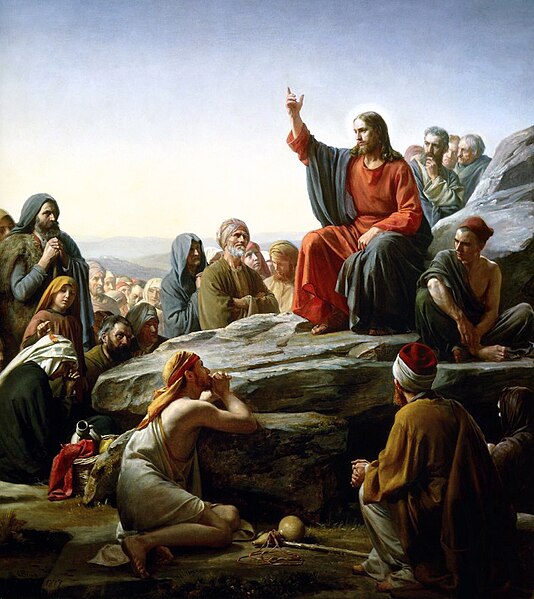If we take the Bible as G-d's word, G-d's word even skips it. Matthew does not talk about the census, and instead, states that they were already living in Bethlehem.
I posted this on page 13, which explains why we can be certain that there was no census: Luke says, in chapter 2, that a decree went out from Emperor Augustus that all the world should register. Luke tells us that this took place while Quirinius was governor of Syria. It then says that all went to their own towns to be registered. This is where we learn that Joseph and Mary lived in Nazareth, and for some odd reason, had to go to Bethlehem in order to register.
That's all false though. So, under Augustus, there were three censuses, 28 B.C.E, 8 B.C.E., and 14 C.E. No record of one during the time of the birth of Jesus, which is generally placed around 4-2 B.C.E. The earliest evidence for a Roman census in Palestine though wasn't until 6 or 7 C.E., after the death of Herod. During the time of Herod, Palestine operated not under direct Roman control, and thus wouldn't be part of a global census.
There is also no real evidence that Quirinius was governor of Syria until after the death of Herod. This leads many scholars to believe that Luke was instead thinking of the census in 6 C.E. Jesus could not have been born that late as in
Luke 1:5, we are told that his birth, or at least conception, was still during the life of King Herod.
The final problem is that there was never any regulation, or reason, for people to travel to their ancestral homes. It didn't make sense. A census was taken for tax reasons. It makes no sense to have everyone travel to their ancestral homes, to register, and screw things up for taxation. It would be like if we were required to return to our ancestral homes today for a census. It throws off every number as there is no way for it to be accurate for any town or city. It makes no sense, and would be a governmental nightmare.
No. There are many biographies about Washington that contain false information. The story of him cutting down the cherry tree, which is included in some of the biographies, is known to be false. It never happened, and we know it never happened because the author of that story has come forward claiming that it is false. Yet, people once believed it.
I'm a historian of magic. One of my primary subjects has been the life of Harry Houdini. I can tell you that I have multiple books on my shelf that claim different reasons for his death, including poisoning, dying during a magic trick, from appendicitis, and from being punched in the stomach. Obviously, not all the them can be true, especially when the details disagree with each other. Not variations of the truth at all.
So what? Well it shows that the stories differ. In Luke, the family lives in Nazareth, before Jesus is born, and returns home to Nazareth, very shortly after Jesus is born. In Matthew, the family lives in Bethlehem, flees to Egypt for a couple of years, and only later on moves to Nazareth. Both stories can't be true as they disagree with each other.
I have shown there are contradictions. Why should we look at them separately? Because they say different things. Luke, in the birth story, is not saying what Matthew is. I showed that clearly above. Thus, you have to read them separately as the stories don't mesh up. I can't read Matthew and claim that the family went to Bethlehem, away from their home in Nazareth, because of a census. Matthew doesn't say that. Matthew says something very different. If you gleam over the differences, then you're not reading the Bible, you're making something up.
One, I haven't asked you questions. Unless they were rhetorical questions. Two, I didn't answer that question as you refuse to address anything I say, but instead keep claiming you will show me how I'm wrong, yet you never do. Three, I've answered basically all your questions, and it goes nowhere, because you never respond back to them. I think its because you know you don't have a valid argument. I've shown that there are in fact discrepancies in the manuscripts, after you asked. I've pointed to verses we can know are false, because you asked. I've shown that the Bible does disagree with itself, such on whether G-d is all knowing, because you asked.
I even told you which college I went to (so you could check it out), just to have you say that it isn't necessary for me to say what college I went to (contradiction on your part).
As for Gal. 4:21-31, what does it have to do with our conversation? Why try to test me, so you can then ignore my answer and insult me?
As for the allegory, Paul explains it himself. Two covenants based on the mothers of Abrahams sons. Those in Christ, according to Paul, are of the second covenant, that of the woman who corresponds to Jerusalem, (which would be Sarah, the mother of Issac). They are free, even though outsiders may persecute them.
And as for did Jesus walk on water? It is a matter of faith. Historically, one can neither confirm or deny that it happened. The study of history is based on probability. Anything is possible, but some things aren't probable. Jesus walking on water would be a miracle, and by definition, would be the least likely thing to have happened. So historically, one can rule it as having a low probability of happening. That doesn't mean it didn't happen, but that one has to take it on faith.

